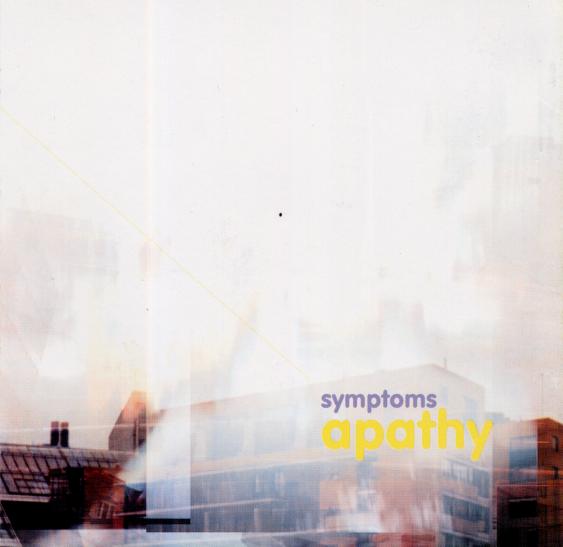 Imagine you're stranded on a rooftop in the middle of a city with cloudy skies above and nowhere to go. Cars buzz past on their way to nowhere in particular and as the day slowly passes, their exhaust fumes fill the air. Time goes by but you know it's an illusion. The world is moving but you're still waiting, watching. This is the feeling imparted by this follow up to Symptoms' rather more varied and up beat self titled debut.Danish sonic explorer Klaus Amitzboll has augmented his one guitar one computer set up with interspersed traffic sounds and this time lets the music unfurl slowly in a suite of deep bass moods coloured predominantly grey. Where Symptoms' first album often relied on a beat backbone is a much more stripped down and atmospheric affair, and consequently the guitar source seems more apparant. Mixed with help from his brother Fred Amitzboll of the excellent machine rock trio Silo, this is otherwise one man's paen to the deadening effect of city living. Two guitar lines, one distorted and one clean, unfurl and cut through a fog of familar doppler shifts of engines forming the forlornly reflective 'Asphalt Mirror'. Eventually a refracting bass line emerges but is soon replaced by held keyboard drone chords. The guitar lines seem to get attenuated and flap ever more morosely in the breeze. The recurring engines seem to suggest a dwarfing, as if the music is being consumed by the city that it's soundtracking, and merging with it. A couple of tracks a are little more than short linking pieces, cars blurring past skeletal loop shadows. 'Stale Air on a City Morning' could be compared to Swim records benefactors Immersion, but where Immersion's 'Low Impact' was warm, Symptoms hum with an ominous and forlorn atmosphere. A momentum builds up gradually but the journey just seems to lead back to the place it started. 'Mute Noise of Longing' is a minimal ambient keyboard sequence, and the following 'Burning to be Gone' captures a similar mood with intertwined processed guitar lines ringing like windchimes. Slowly a piano melody plays out amongst the ever moving cars. Distortion levels rise as the coda plays out, and the pollution keeps on choking until it rips a 'Crack in the Sky' towards which wistful whistles rise. This album might only be 46 minutes long, but it could almost be a soundtrack to a stop motion film of a city over ten or twenty years, as buildings rise up and crumble and shift, changes that are barely perceptible from day to day. Sleevenotes: "When you understand how things are, you lose yourself quietly standing, fading into the quiet of all things dead."
Imagine you're stranded on a rooftop in the middle of a city with cloudy skies above and nowhere to go. Cars buzz past on their way to nowhere in particular and as the day slowly passes, their exhaust fumes fill the air. Time goes by but you know it's an illusion. The world is moving but you're still waiting, watching. This is the feeling imparted by this follow up to Symptoms' rather more varied and up beat self titled debut.Danish sonic explorer Klaus Amitzboll has augmented his one guitar one computer set up with interspersed traffic sounds and this time lets the music unfurl slowly in a suite of deep bass moods coloured predominantly grey. Where Symptoms' first album often relied on a beat backbone is a much more stripped down and atmospheric affair, and consequently the guitar source seems more apparant. Mixed with help from his brother Fred Amitzboll of the excellent machine rock trio Silo, this is otherwise one man's paen to the deadening effect of city living. Two guitar lines, one distorted and one clean, unfurl and cut through a fog of familar doppler shifts of engines forming the forlornly reflective 'Asphalt Mirror'. Eventually a refracting bass line emerges but is soon replaced by held keyboard drone chords. The guitar lines seem to get attenuated and flap ever more morosely in the breeze. The recurring engines seem to suggest a dwarfing, as if the music is being consumed by the city that it's soundtracking, and merging with it. A couple of tracks a are little more than short linking pieces, cars blurring past skeletal loop shadows. 'Stale Air on a City Morning' could be compared to Swim records benefactors Immersion, but where Immersion's 'Low Impact' was warm, Symptoms hum with an ominous and forlorn atmosphere. A momentum builds up gradually but the journey just seems to lead back to the place it started. 'Mute Noise of Longing' is a minimal ambient keyboard sequence, and the following 'Burning to be Gone' captures a similar mood with intertwined processed guitar lines ringing like windchimes. Slowly a piano melody plays out amongst the ever moving cars. Distortion levels rise as the coda plays out, and the pollution keeps on choking until it rips a 'Crack in the Sky' towards which wistful whistles rise. This album might only be 46 minutes long, but it could almost be a soundtrack to a stop motion film of a city over ten or twenty years, as buildings rise up and crumble and shift, changes that are barely perceptible from day to day. Sleevenotes: "When you understand how things are, you lose yourself quietly standing, fading into the quiet of all things dead."
 
samples:
 
Read More

